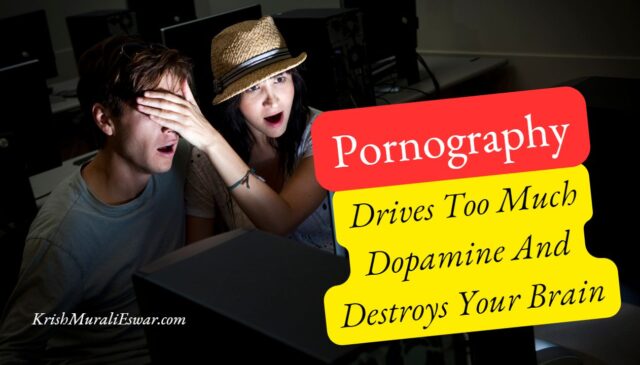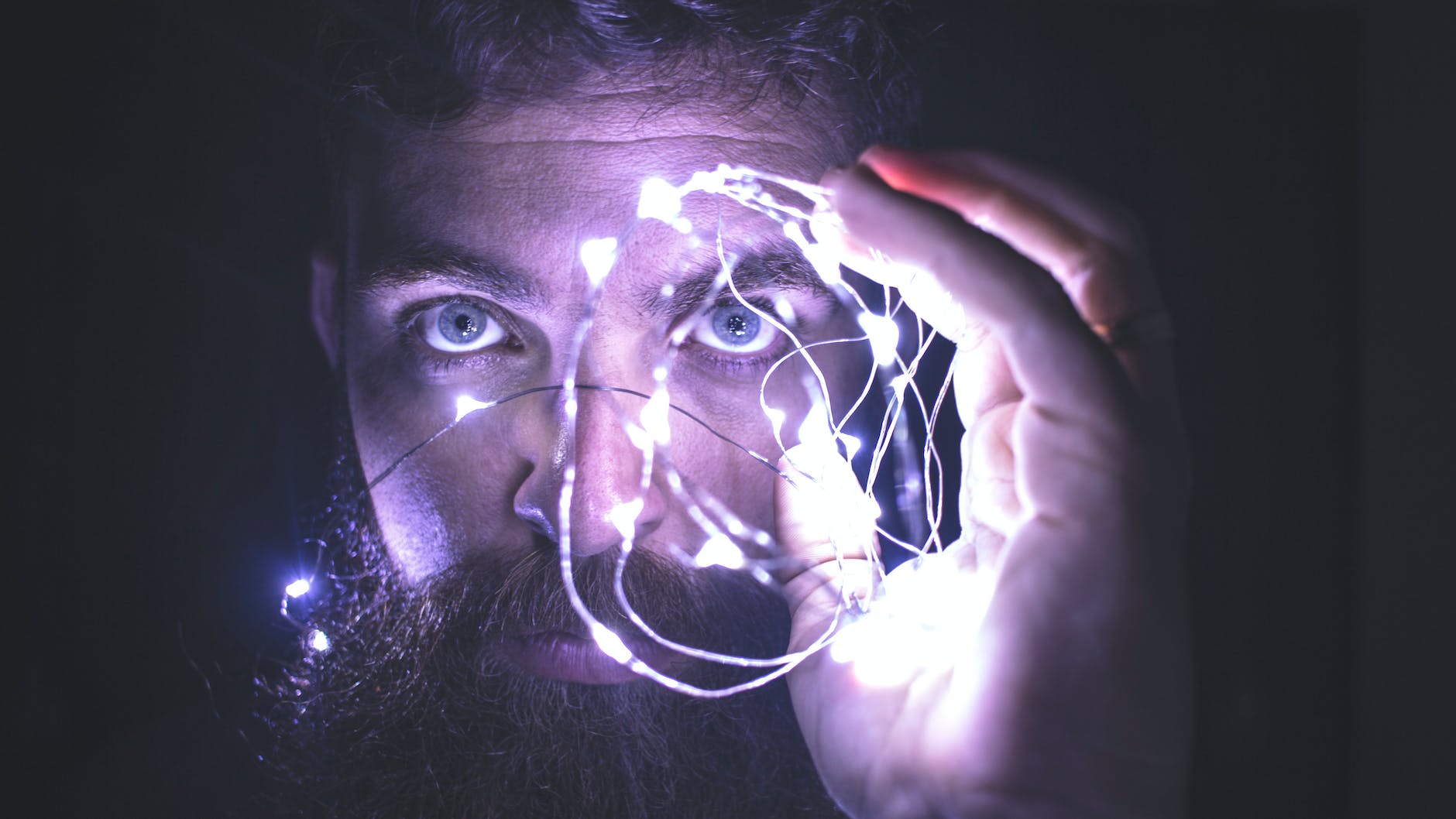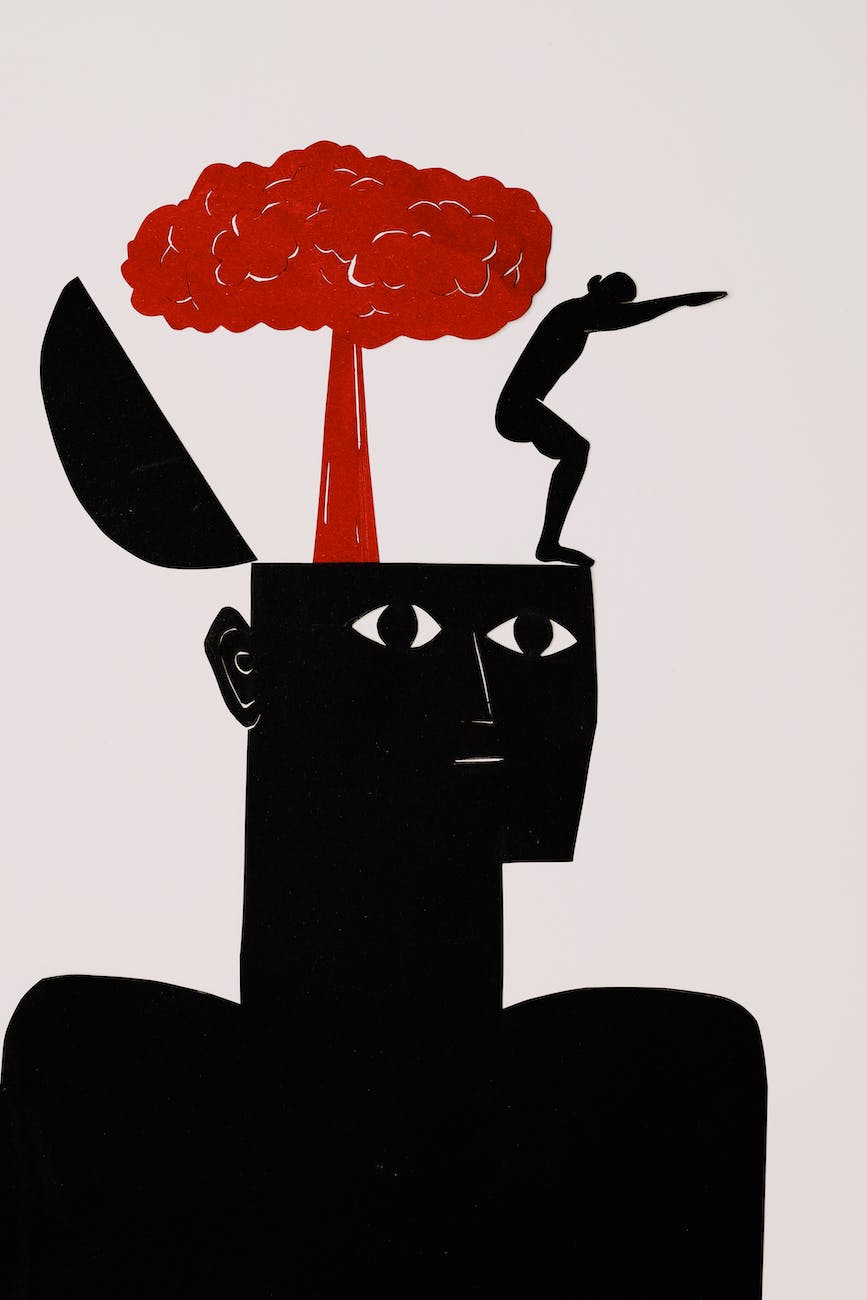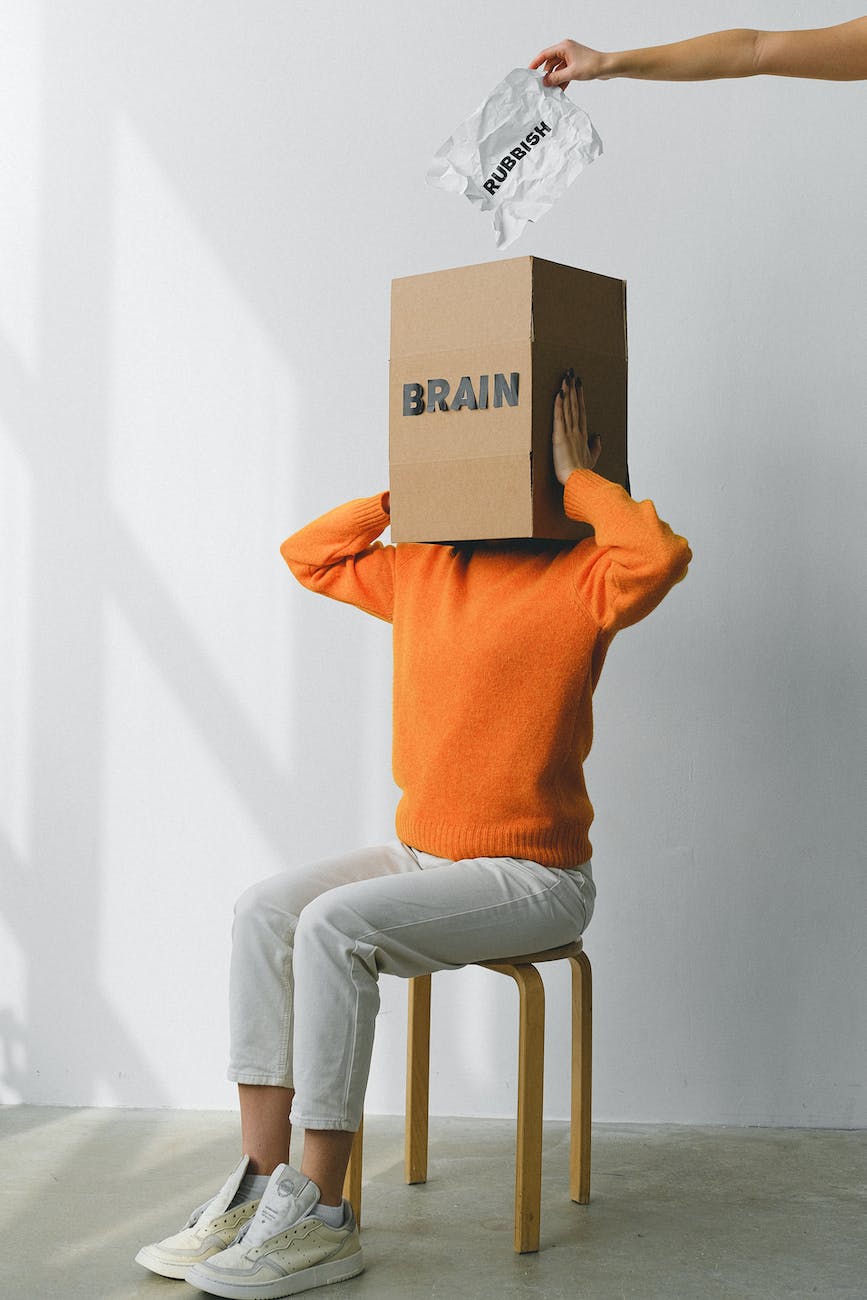
Do you know what happens when too much dopamine drives your brain? It’s a nightmare that no one wants to experience. Pornography has the potential to destroy your mind and completely ruin your life if you let it!
We’ve all heard stories of people whose lives were ruined by pornography addiction, but few of us understand just how powerful this drug can be. With its seductive power, porn robs our brains of natural functioning and sets off an avalanche of negative consequences.
In this article, we’ll take an in-depth look at how pornography drives too much dopamine and destroys our brains. Prepare for an eye-opening journey into the depths of human psychology – fasten your seatbelts!
How Pornography Increases Dopamine Levels
Pornography drives up dopamine levels. It’s like a drug that gives you an instant rush of pleasure and reward, without any effort or consequences. Your brain is then flooded with dopamine, leading to addiction.
But this isn’t healthy for your mind. It can lead to changes in the way it works, causing problems with memory and concentration, as well as impulsivity.

You may also find yourself feeling depressed after using pornography because the dopamine has been used up and needs more time to rebuild itself again. This can make it harder to enjoy things in life that don’t involve porn, such as social interaction or hobbies.
Relying on porn too heavily can impact relationships by making real-world interactions feel less enjoyable than they should be.
In short, when it comes to our brains, we need to take care not to rely too much on pornography – its effects are far from beneficial!
What Is Dopamine And How Does It Affect The Brain?
Dopamine is a neurotransmitter that plays an important role in pleasure and reward-motivated behavior. It’s often described as the “happy” hormone because it helps control motivation, pleasure, and desire. But dopamine can also be dangerous if levels become too high or out of balance.
When exposed to pornography, our brains are flooded with a sudden burst of dopamine which can lead to addiction. Over time, this surge of dopamine can cause damage to certain brain regions responsible for decision-making, impulse control, and self-regulation – leading to decreased cognitive functioning and impaired attention span.

TIP: If you’re struggling with excessive porn consumption, find healthier ways to boost your dopamine levels like exercising, meditating, or engaging in creative activities like painting or playing music. These activities will help keep your dopamine levels balanced while still providing positive rewards.
The Negative Consequences Of Pornography Addiction
The spiraling vortex of pornography addiction is a prison no one should ever have to experience. Like an insidious fog, it covers the entire landscape and refuses to leave its victims alone. A deep dive into this murky world reveals something even more sinister – how porn drives too much dopamine and destroys your brain. It’s time we take a closer look at what that means for us.
Firstly, dopamine is a neurotransmitter connected with reward-seeking behaviors like addiction and pleasure-seeking. Its purpose in our brains is to make us feel good about ourselves when we do things that are beneficial for our survival. Unfortunately, studies show that too much dopamine from viewing pornographic content can cause changes in the way the brain processes emotions and rewards leading to psychological issues such as lowered self-esteem, anxiety, depression, and impulsive behavior.
Secondly, pornography affects relationships by diminishing trust between partners which can lead to feelings of insecurity or rejection. People addicted to porn may also find themselves feeling disconnected from their partner because they’re not able to share intimate moments without comparing them to unrealistic scenes found online. This could result in lower sexual satisfaction due to a lack of communication or emotional connection with another person during physical intimacy.

Finally, pornography use has been linked to various health problems including erectile dysfunction in men due to desensitization caused by overexposure to sexually explicit material; increased risk of developing mental health disorders; difficulty forming meaningful relationships; decreased motivation; poor concentration; sleep disturbances, and much more. These consequences can be devastating both physically and mentally if left untreated.
It’s clear that although some people might see pornography as harmless entertainment, there are real dangers associated with it that must be addressed before further damage can be done to individuals’ lives, relationships, and overall well-being. All those affected deserve better than what porn offers – freedom from bondage through authentic love and connection with others.
The Impact Of Pornography On Relationships
Breaking the bonds of intimacy, and pornography addiction can be a slippery slope for relationships. It’s like walking on eggshells; one wrong step and could spell disaster. Too many people are getting caught up in the thrill of viewing pornographic content, losing sight of their relationship goals in the process.
The dopamine hit from consuming porn may feel great initially but over time this pleasure starts to fade away – replaced by feelings of emptiness, guilt, and shame. This leads to an increase in secrecy between partners as each tries to hide their addiction out of fear that it will damage their relationship beyond repair. Regrettably, these secrets start to create rifts between them until eventually, communication breaks down entirely, leading to resentment and mistrust.

Pornography not only destroys trust within a relationship; it also has far-reaching consequences such as reduced sexual satisfaction due to unrealistic expectations being set or increased anxiety which further strains any attempt at connection with a partner.
The reality is that no amount of digital stimulation can replace genuine human interaction when it comes to cultivating healthy relationships.
The Long-Term Effects Of Pornography On Mental Health
Pornography can have a devastating effect on mental health. It’s been linked to depression, anxiety, and low self-esteem. The overstimulation of dopamine caused by watching porn leads to addiction, making it harder for people to be satisfied in real relationships or focus on other tasks.
It doesn’t just harm the user; their partner might not understand why they’re withdrawing from them, leading to feelings of insecurity and mistrust. This can cause serious long-term damage to any relationship if left unchecked.

The effects of pornography use are insidious and should not be underestimated – regular consumption changes your brain chemistry and desensitizes you to pleasure, leaving you dependent upon increasing levels of stimulation for satisfaction.
We must take steps now to protect ourselves against this damaging force before its destructive power takes hold.
How Pornography Activates Reward Circuits In The Brain
Pornography has become ubiquitous in modern life, with a recent survey indicating that over 90% of Americans have viewed it. It may be seen as harmless entertainment, but the effects on our brains are far from benign.
When exposed to porn, dopamine is released in large amounts; this neurotransmitter is responsible for pleasure and motivation. Sexually explicit images activate reward pathways which create an artificial feeling of gratification – much like drugs or alcohol do. Unfortunately, these reward systems can become desensitized when used too often leading to addiction. In fact, research suggests that approximately 11% of individuals who view porn develop an unhealthy relationship with it.
This phenomenon goes beyond simple pleasure-seeking behavior; studies show that frequent exposure to pornographic material leads to changes in the brain’s structure and function.
Neuroplasticity enables us to learn new things, form memories, and adapt our behaviors accordingly.

However, if we make use of activities such as viewing porn excessively then we risk causing harm via damaging neural pathways associated with self-control and impulse regulation – leaving ourselves vulnerable to further addictions or other addictive behaviors down the line.
The impact of pornography on mental well-being should not be underestimated; its ability to hijack reward networks within the brain can cause serious psychological distress over time if abused regularly.
With more people than ever before having access to online content, understanding how excessive consumption of certain materials affects our biology becomes increasingly important so that appropriate measures can be taken to protect both physical and mental well-being.
The Role Of The Prefrontal Cortex In Pornography Addiction
The prefrontal cortex is responsible for decision-making and impulse control – two key aspects of regulating behavior.
Our prefrontal cortex helps us make decisions based on our values and moral standards; however, when confronted with frequent exposure to porn, these abilities start to deteriorate.
The more often someone views pornographic content without any regulation from the prefrontal cortex, the harder it will be for them to regain self-control. It’s not just about pleasure anymore; instead, it’s about trying desperately to fill an emotional void.
As such, those who engage in excessive viewing of porn risk damaging their ability to form meaningful relationships and develop healthy coping mechanisms.
Neurochemical Changes Associated With Pornography Addiction
Pornography addiction has the power to alter our brain chemistry. Dopamine influx can lead to significant neurochemical changes in our brains over time.
An excessive amount of dopamine leads to physical changes in the circuitry of the prefrontal cortex – it literally rewires itself due to continued exposure to pornographic material.
These relentless surges of dopamine can cause us to become addicted to pornography; we crave more and more stimulation as we try desperately (and unsuccessfully) to achieve higher levels of satisfaction than before.
The result is a distorted view of sex and relationships, making it difficult or impossible for us to find true fulfillment in these areas. We may also experience mental health issues such as depression, anxiety, or social phobias as the compulsion takes its toll on our lives.
The Effect Of Pornography On Memory And Cognitive Function
It’s amazing how often we ignore the effects of pornography on our memory and cognitive function. We know it’s not good for us, yet we are still drawn to its allure like a moth to a flame. It may be time to take a closer look at what this fascination is doing to our brains and bodies.

The dopamine rush that comes with watching porn can have serious consequences in terms of brain health, especially over an extended period of use:
- Negative impacts on memory & cognitive function:
- Reduced ability to retain information
- Impairment to recall memories
- Decreased concentration spans
- Physical changes in the brain:
- Diminished impulse control
- Altered neural pathways
- Weakened self-control functions
Pornography disrupts natural reward systems, leading users into a cycle of compulsive behavior that can be hard to break out of without help. This addiction also has long-term implications such as decreased libido, depression, anxiety, and erectile dysfunction.
The bottom line is that what may seem pleasurable at the moment could come with serious neurological side effects down the road.
The Role Of Stress And Anxiety In Pornography Addiction
Pornography addiction is a pervasive problem that has plagued society for years. Struggling with stress and anxiety, many people turn to pornography as an escape from their troubles, yet this only serves to further compound the issue. Examining the role of these two triggers in pornography addiction can offer deeper insights into how we might help those affected by it.
Stress and anxiety are two powerful emotions that often lead people down a spiral of unhealthy behavior. In particular, they push individuals towards searching for comfort or satisfaction through porn consumption. This cycle starts innocently enough but quickly spirals out of control, leaving users feeling helpless and even more stressed out than before.

Here’s how:
- Stress heightens cravings for pleasure-seeking activities like watching porn;
- Anxiety makes us seek out instant gratification instead of finding healthy coping mechanisms;
- Both conditions make us feel isolated and ashamed, so we keep turning back to porn for solace.
Such compulsive behaviors have serious consequences on our mental health and well-being—memory loss, cognitive decline, depression, low self-esteem, etc.—and all too often become unbreakable cycles of addiction.
It’s important then to be aware of the potential dangers associated with this kind of activity so that we can work together towards helping those who struggle with it move forward in healthier ways.
We must encourage compassion rather than judgment while also providing practical solutions such as therapy groups or support networks. Only then can we begin to shift the paradigm around porn addiction and create real change within ourselves and our communities.
How Technology Has Facilitated Pornography Addiction
Technology has changed the way people interact with pornography. It’s now never been easier to access, and it can be consumed quickly without any physical presence. This facilitates addiction for those who are vulnerable.
The advent of technology has removed many barriers to accessing porn that used to exist in pre-digital times. Now, all you need is a device and an internet connection to get your hands on whatever kind of content you want in mere seconds. As such, we’ve seen a huge rise in porn consumption since the introduction of digital devices into our lives. People don’t have to go out of their way or take risks anymore – they just search for what they want online and watch it right away.

This ease of access has had serious consequences when it comes to addiction; not only does it make getting hooked on porn much more likely, but also makes breaking free from the habit far harder than before due to its convenience and ubiquity.
We’re stuck in an infinite loop where we struggle to break away from something that’s always available at our fingertips – this ultimately leads to dopamine overload which damages brain functioning over time if left unchecked.
Tips For Overcoming Pornography Addiction
Overcoming pornography addiction requires dedication and commitment. It’s a long journey, but it can be done with the right attitude. Here are some tips to help you on your way:
- Take control of your environment: Create boundaries for yourself and make sure you stick to them; block explicit content; unfollow or unsubscribe from sites that may trigger cravings; create an accountability system such as having a friend check in regularly.
- Develop healthier habits: Find activities that bring joy like exercising, meditating, reading books, playing music, and writing poetry; schedule time with friends and family who support you; establish healthy eating habits – nutrient-rich foods will boost dopamine levels naturally while avoiding processed sugar and caffeine.
- Build resilience: Learn how to manage stress through relaxation techniques like deep breathing exercises, yoga poses, or meditation sessions; cultivate self-compassion by recognizing negative thoughts as they come up and reframing them in more positive ways rather than beating yourself up about past mistakes.

This is just the beginning – it takes determination and hard work to break free from pornography addiction, but there is hope! With consistent effort over time, this challenge can be overcome. You have within you all of the strength needed to succeed – now use it!
How To Reduce Exposure To Pornography
Reducing exposure to pornography can be a difficult task, but it’s essential for maintaining healthy dopamine levels in the brain. Here are a few tips that may help:
- Limit access by blocking websites and apps. A good starting point is installing an app blocker like Freedom or Cold Turkey on your device which will block all porn sites.
- Spend time with people who don’t watch porn. Hang out with friends who aren’t into porn and engage in activities that won’t lead you down the wrong path.
- Replace bad habits with positive ones. Find something else to do when you have free time – reading books, playing sports, attending support groups, etc. Anything that distracts from watching porn will be beneficial in reducing exposure to it.
- Seek professional counseling or therapy if needed. If none of these strategies work, then consider talking to a therapist or counselor about how to address the problem more deeply and find lasting solutions.
Breaking free from addiction requires willpower and dedication; however, there is hope for those struggling with excessive amounts of dopamine due to pornography consumption. By taking steps such as limiting access, forming healthier relationships, replacing negative habits with positive ones, and seeking professional help when necessary, one can make progress towards overcoming this challenge and restoring balance within their life once again.
The Benefits Of Seeking Professional Help For Pornography Addiction
For those dealing with pornography addiction, seeking professional guidance has the potential to provide immense benefits.
A trained therapist can equip individuals with the knowledge they need to understand their addiction and develop healthier coping mechanisms. Through cognitive behavioral therapy, addicts will learn how to recognize negative thoughts or behaviors associated with their addiction and use positive strategies instead. Such techniques may include stress-management activities such as meditation, yoga, or other forms of physical exercise.

In addition, talking about porn addiction in counseling sessions provides a safe space for individuals to examine any underlying issues which may have led them down this path in the first place — whether it be feelings of insecurity, depression, or unresolved trauma.
Furthermore, some professionals also offer workshops on topics like anger management or healthy communication skills which are specifically designed to increase self-awareness while helping addicts stay away from addictive substances/behaviors.
All these methods can empower individuals to make progress toward recovery by giving them tools that enable them to take control of their lives again.
The Need For Increased Awareness And Education On Pornography Addiction
Pornography addiction is a serious issue that’s often overlooked. It affects more than just the user, impacting their family and friends as well. That’s why it’s so important to raise awareness about this growing problem and educate people on how to prevent it from happening in the first place.
Educating ourselves and others about pornography addiction can help us better understand what causes it, how best to address it, and most importantly, how to avoid falling into its trap.
Understanding the warning signs of an addiction can also be incredibly beneficial. This includes recognizing when someone is spending too much time engaging with porn or if they start exhibiting any negative behaviors associated with their usage.
TIP: Be sure to reach out for help if you think you may have a pornography addiction–it’s never too late! There are numerous resources available online and off that can provide guidance and support throughout your journey towards recovery.
Frequently Asked Questions
Is Pornography Addictive?
There’s strong evidence to suggest that porn does have the potential to be highly addictive. To put it plainly: too much porn can ruin your brain like a bull in a china shop!
Pornography addiction doesn’t just affect adults either; young people are especially vulnerable due to their developing brains being more susceptible to this kind of damage.
Does Pornography Lead To A Decrease In Dopamine?
Surely, you’ve heard the popular phrase that “too much of anything can be bad for you.”
When someone watches pornography, their brain releases large amounts of dopamine which can quickly become addictive as they start seeking out more intense stimulation over time. As a result, regular exposure to pornographic content often leads to a decreased sensitivity to pleasurable activities outside of pornography such as having real-life relationships or engaging in physical activities like going on hikes with friends.
Is There A Correlation Between Pornography And Depression?
Recent studies suggest that there is a strong correlation between pornography use and depression. While the exact cause of this link is not known, it’s clear that an individual’s mental health can be affected by excessive viewing of pornographic material.
Here are three ways this correlation between pornography use and depression manifests:
- Physiological Effects: Excessive consumption of pornography leads to an increase in dopamine levels which can eventually disrupt important aspects of daily functioning such as concentration and emotional regulation;
- Emotional Fallout: Prolonged exposure to explicit material causes users to become isolated from others resulting in decreased self-esteem and sense of belonging;
- Desensitization: Viewing overly exaggerated erotic scenes on screen makes it harder for viewers to connect emotionally during intimate moments with partners offline leading them towards feelings of disconnection and dissatisfaction.
These effects have profound implications on our physical and psychological well-being causing us to feel overwhelmed, stressed out, anxious or depressed over time if we don’t take the steps necessary for reestablishing balance within our minds and lives.
Is There A Safe Level Of Pornography Consumption?
The consequences of pornography consumption are often debated.
We can’t ignore how dopamine drives us to consume more. It’s an addiction that steals away our self-control, leaving us vulnerable to its effects. As with any addiction, we become dependent on new highs; seeking out further stimulation until the brain can no longer cope.
Never be tempted by the siren song of porn. It will only lead to a dead end. Instead, I urge you to seek the solace of meditation and self-reflection. These practices will bring you closer to understanding yourself and your highest potential.
What Are The Most Effective Methods Of Reducing Pornography Consumption?
Pornography consumption has become an issue of concern in recent years. The effects on the brain, especially with dopamine overstimulation, are not to be taken lightly. So what can we do about it? How can we reduce our pornography consumption?
One solution is to practice meditation and introspection in silence. By being aware of your own triggers and motivations for seeking out pornographic material, you can start to build better habits that don’t involve addictive behavior. Additionally, consider avoiding certain websites or apps altogether by blocking them from your device as a preventative measure.
How to Transmute Sexual Energy?
An effective step to control porn watching may be to transmute your sexual energy to spiritual energy through the practice of Kayakalpa Yoga. Visit kayakalpayoga.edu.in or visit a Vethathiri SKY Yoga center near you.
Conclusion
Pornography can be an addictive and dangerous habit, leading to a decrease in dopamine levels. It’s been linked to depression as well as other mental health issues. The key is moderation when it comes to pornography consumption; too much of it can have serious consequences for your brain and overall well-being.
Practicing self-control will help you remain aware of how much time you’re spending viewing pornographic material, and sticking to those boundaries can make all the difference when it comes to protecting your mental health.
Finally, don’t forget that there are plenty of healthier outlets available if you’re looking for pleasure or escape from reality – books, music, movies, art – whatever works best for you!
I’m urging everyone who finds themselves turning to porn too often: to try a dopamine detox.
You’ll thank yourself later!
If you liked what you read, don’t forget to subscribe and leave a comment below! We’d love to hear your thoughts and feedback.
Be Blessed by the Divine!
Krish Murali Eswar.
External Resources for Help
https://www.yourbrainonporn.com/support-apps-forums-websites-books/
External References
https://extension.usu.edu/relationships/research/effects-of-pornography-on-relationships
https://wou.edu/westernhowl/understanding-and-treating-an-unhealthy-relationship-with-porn
https://www.str.org/w/how-porn-affects-your-brain
https://europepmc.org/abstract/med/15573884
https://dx.doi.org/10.3390%2Fjcm8010091
Leave a Reply